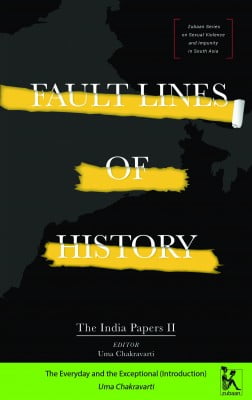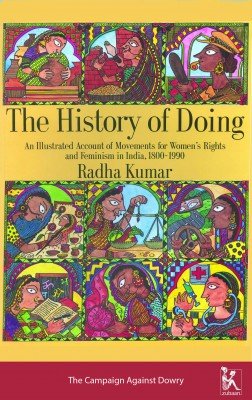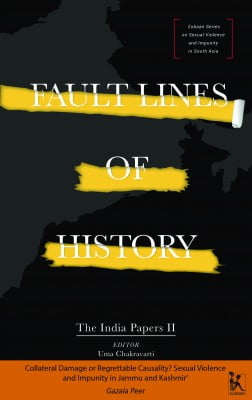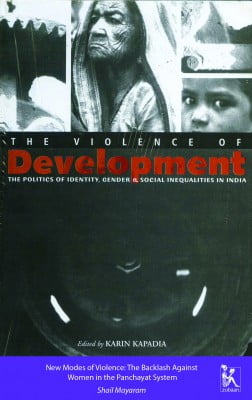No products in the cart.
Return To ShopOur e-Essays project is now LIVE! Previously-released essays are available here, and each month a new essay is available for free with any other purchase.
To be added to the mailing list, subscribe here!
The first five sets of e-Essays focused on Indian women’s movements, sexual violence, domestic space and kinship, religion and conflict and state crimes and impunity. Three strong essays comprise our sixth e-essays set, which focuses on legislation passed in India and its relationship with structures of violence from three consecutive loci. The first deals with legislation being a partially successful result of feminist protest against dowry in the 70s and 80s, while the second with the implications of the Armed Forces Special Powers Act (AFSPA) in Jammu & Kashmir, which allows the nation’s military forces to try themselves for (often violent and gendered) crimes in courts of their own making. The third essay discusses the implementation of the 73rd Amendment and how reservations for marginalised populations in Panchayati Raj institutions have initiated a backlash against women who are elected leaders from these populations. These three parallel engagements with law break apart the illusion of neutral or perfect legislation, challenging the foundation upon which that idea is built.
1) ‘The Campaign Against Dowry’ by Radha Kumar from The History of Doing: An Illustrated Account of Movements for Women’s Rights and Feminism in India, 1800-1990 (1999)
Radha Kumar tracks the history of protests against dowry in the contemporary women’s movement, starting from the first demonstrations at Hyderabad in 1975 and leading up to significant legal amendments in the early 1980s. Interspersed with historic photographs of the movement in its crucial stages, the essay captures the wave of protests that spread across the country, bringing disparate groups together to revolt against dowry-related crimes.
Kumar’s essay delves into the way that feminists challenged the dominant ideological mode that rendered violence against women a private, family matter – particularly in Delhi, where the campaign was more sustained – and how, over time, activists expanded their methods of seeking redress. The campaign, as it gained traction, sought action not only through legal investigation, which had been negligible in dowry crimes, but also through social pressure on the perpetrators. 12pp.
Read more.
Dr. Radha Kumar is the Chair of the United Nations University Council and theDirector General of the think tank Delhi Policy Group. She has published various books and journal articles, and her work looks at ethnic conflicts, peacemaking and peacebuilding from a feminist perspective.
________________________________________________________________________________________________
2. ‘Collateral Damage or Regrettable Casualty? Sexual Violence and Impunity in Jammu & Kashmir’ by Gazala Peer from Fault Lines of History: The India Papers II (2016)
Gazala Peer’s essay, written against the backdrop of militarization and the existing Armed Forces Special Powers Act in Jammu & Kashmir, explores obstacles faced by survivors of sexual violence in seeking redress when the perpetrators of this violence are members of the armed forces.
Since the imposition of AFSPA in Kashmir, the Indian government has not granted sanction for the prosecution of any armed personnel in any court of law. Although in principle the provision of prosecuting army personnel under court martial trials does exist, Peer questions whether these trials, taking place within the structure of the army itself, can ever be a substitute for trial in civil courts. To this end, Peer closely examines the context and process of the court martial, arguing that this system, in cases of sexual assault and violence perpetrated by its forces (which the army views as “breaches of discipline”), is disposed to be lenient toward the perpetrators, maintaining martial impunity. 39pp.
Read more.
Gazala Peer is a lawyer and independent researcher born and brought up in Kashmir. She is currenlty a doctoral candidate in constitutionalism at the Centre for the Study of Law and Governance, Jawaharlal Nehru University, New Delhi. Before joining JNU, she practised law at the High Court of Jammu & Kashmir.
__________________________________________________________________________________________________
3. ‘New Modes of Violence: The Backlash Against Women in the Panchayat System’ by Shail Mayaram from The Violence of Development: The Politics of Identity, Gender & Social Inequalities in India (2003)
The 73rd Amendment (1992) to India’s constitution has not only given rural local governments (Panchayati Raj institutions) constitutional status, but has also ensured that women and other marginalized communities have reserved seats in these bodies. The amendment has helped facilitate the entry of rural women in the public sphere. However, the visibility and presence of women in rural politics has been met with a lot of backlash. In this essay, Shail Mayaram uses qualitative data from her fieldwork in Rajasthan to highlight the ‘new modes of violence’ that elected women representatives face, like physical violence, forced stripping, and verbal abuse. Her research demonstrates how caste politics, the police, and patriarchy form a nexus to protect the perpetrators, and questions how to effectively translate ‘good’ legislation into functioning policies. 32 pp.
Shail Mayaram is Professor at the Centre for the Study of Developing Societies, New Delhi, and Adjunct Professor at the Delhi School of Economics. In the past she has held a Visiting Chair at Tel Aviv University and Aligarh Muslim University, and has been awarded Fulbright, Rockefeller and other prestigious fellowships.
___________________________________________________________________________________________________
FREE IN AUGUST, WITH THE PURCHASE OF ANY OTHER ESSAY:
‘The Everyday and the Exceptional: Sexual Violence and Impunity in Our Times (Introduction)’ by Uma Chakravarti from Fault Lines of History: The India Papers II (2016)
 Uma Chakravarti’s introduction to Fault Lines of History: The India Papers II uses a brief history of protest in the north-eastern states of India to illustrate the contract between the state, the army and the rule of law. Detailing the spread of AFSPA as a result and a feature of this contract, Chakravarti points to particular building blocks in the story of resistance in the area — the case of Manorama, Irom Sharmila’s hunger strike, the naked protest by imas in Manipur among others — and castigates mainstream state theorists’ neglect of AFSPA’s existence and growing application as a tool of oppressive state-building. She explains how the postcolonial state’s painting of AFSPA and militarisation, and the accompanying conflicts, as ‘states of exception’ is key to the contract, which is characterised by the tension between the rule of law and the state’s need for avowal of sovereign emergency.
Uma Chakravarti’s introduction to Fault Lines of History: The India Papers II uses a brief history of protest in the north-eastern states of India to illustrate the contract between the state, the army and the rule of law. Detailing the spread of AFSPA as a result and a feature of this contract, Chakravarti points to particular building blocks in the story of resistance in the area — the case of Manorama, Irom Sharmila’s hunger strike, the naked protest by imas in Manipur among others — and castigates mainstream state theorists’ neglect of AFSPA’s existence and growing application as a tool of oppressive state-building. She explains how the postcolonial state’s painting of AFSPA and militarisation, and the accompanying conflicts, as ‘states of exception’ is key to the contract, which is characterised by the tension between the rule of law and the state’s need for avowal of sovereign emergency.This chapter provides a valuable cross-section of the volume, summarising each author’s argument while drawing connections between them and larger themes of impunity, militarisation, conflict, revolution, state (un)accountability, ‘security’ and feminist scholarship. 34pp.
Read more.
Read more.
Dr. Uma Chakravarti is a feminist historian who taught at Miranda House, Delhi University. She writes on Buddhism, early Indian history, the 19th century and on contemporary issues.
_________________________________________________________________________________________________
A note on pricing, frequency and format:
The e-Essays project is a new initiative from Zubaan, undertaken to make our near-fifteen years of feminist research more accessible to our readers and community. Ten new essays are released each month (on the 1st, 11th, and the 21st), each set curated to a theme; subscribers receive each curated set in their inbox. The essays range from just a few pages to 100-page chapters, and we’ve therefore created three pricing tiers: 50, 70 and 95 rupees. Responses to our test survey in March indicated that a majority of readers would be willing to pay up to Rs. 100, so we’ve kept even the longest essay under that amount. The vast majority of our readers also included PDFs in their preference of format, and we have accordingly standardised all our essays in PDF files.
If you’re interested to see what’s coming next, make sure you’ve joined our mailing list, and keep your eye out for the next mailer/blog post.
Happy Reading!





Leave a comment
You must be logged in to post a comment.